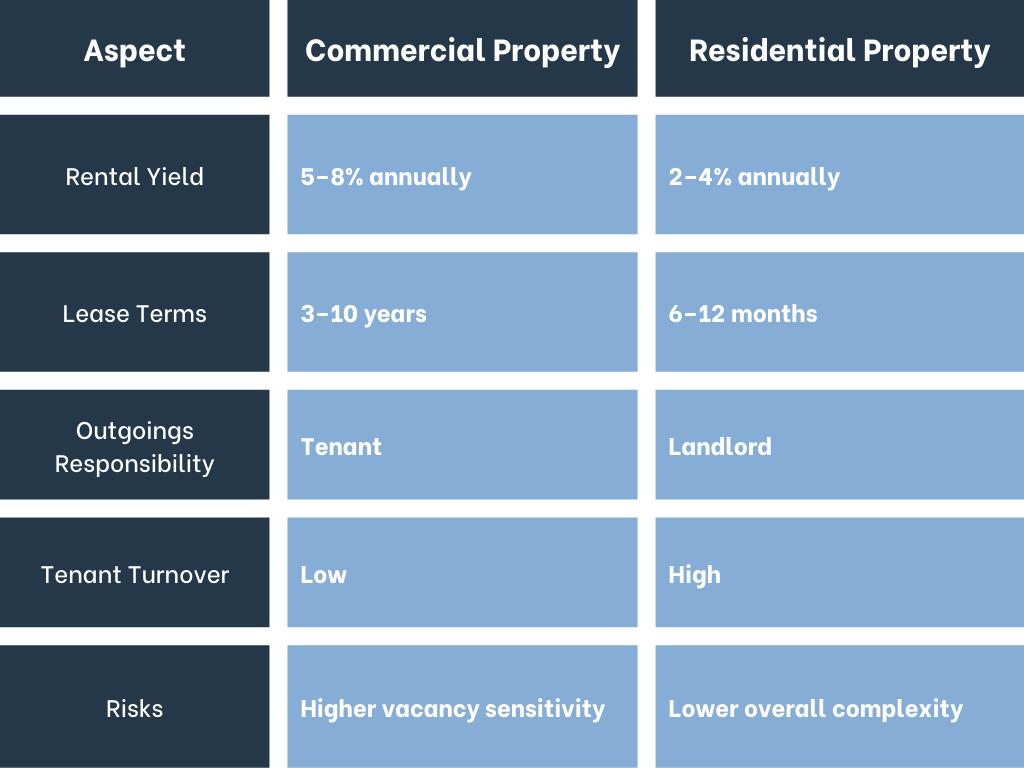Why Choose Commercial Property Over Residential Property?

Investing in property is a time-tested way to build wealth, but the choice between commercial and residential properties requires careful consideration. While both offer opportunities, commercial properties often stand out for investors looking to maximise returns and diversify their portfolios.
This guide, tailored for Australian property investors, highlights why commercial properties might be the smarter choice for your investment strategy.
This guide, tailored for Australian property investors, highlights why commercial properties might be the smarter choice for your investment strategy.
1. Higher Rental Yields
One of the biggest draws of commercial property is its potential for higher rental returns.
- Commercial properties: Yield on average 5–8% annually, offering steady income streams.
- Residential properties: Typically yield 2–4% annually, meaning commercial properties can provide double or even triple the returns in some cases.
For example, a $1 million investment in a commercial property could generate $50,000–$80,000 annually, compared to just $20,000–$40,000 from a residential property.
2. Longer Lease Terms
Commercial leases often range from 3 to 10 years, significantly reducing tenant turnover and vacancy risks. By contrast, residential leases usually last only 6 to 12 months, requiring more frequent tenant sourcing and higher associated costs.
Long-term leases in commercial properties also provide:
- Stability: Predictable cash flow over several years.
- Secure income: Tenants are often bound by lease agreements that protect the investor.
3. Tenants Cover Outgoings
Commercial tenants are typically responsible for paying many of the property’s operating expenses, known as outgoings, which include:
- Council rates
- Building insurance
- Property maintenance
In residential properties, landlords often bear these costs. This makes commercial properties far more cost-effective for investors, potentially increasing net rental income by 30–40%.
4. Diversification for Risk Reduction
Commercial properties provide an opportunity to diversify your investment portfolio, reducing dependency on the housing market.
Residential market risks: Often tied to economic factors like housing affordability and interest rates.
Commercial market risks: More influenced by business performance, infrastructure development, and local economic activity.
For example, during a residential downturn, industrial properties like warehouses may thrive due to increased demand from sectors like e-commerce.
5. Potential for Capital Growth
Prime commercial properties located in high-growth areas can experience significant capital appreciation over time.
- Properties near infrastructure projects or in growing business hubs often see faster value increases than residential properties.
- Example: A commercial property near a newly developed transport hub can appreciate by as much as 15–20% within 5 years, far exceeding the national average for residential properties.
6. Risks to Consider
While commercial properties offer many advantages, they come with some risks
1. Vacancy Periods:
- Commercial properties may take longer to lease if a tenant vacates.
- Mitigation: Focus on properties in high-demand areas with diverse tenant pools.
2. Economic Sensitivity:
- Business performance directly impacts demand for commercial spaces.
- Mitigation: Diversify your portfolio across industries to reduce exposure.
Why Commercial Over Residential? A Quick Comparison


Is Commercial Property Right for You?
Choose commercial property if:
- You prioritise higher rental yields and secure long-term income.
- You want to reduce ongoing expenses by leveraging tenant-covered outgoings.
- You’re looking to diversify your portfolio beyond residential investments.


How Lagos Financial Can Help
At Lagos Financial, we specialise in helping Australian property investors navigate the complexities of commercial property financing. Our mortgage brokers can:
- Tailor investment strategies to align with your financial goals.
- Connect you with competitive lenders for the best financing terms.
- Guide you through every step, from planning to property settlement.
Frequently Asked Questions
What are the key differences between commercial and residential property investments?
Commercial properties generally offer higher rental yields (5–8%), longer lease terms (3–10 years), and tenant-paid outgoings, while residential properties typically provide lower yields (2–4%), shorter leases, and fewer risks but more landlord responsibilities.
Are commercial properties more profitable than residential properties?
Yes, commercial properties can be more profitable due to higher yields and reduced expenses, as tenants often cover outgoings. However, profitability depends on factors like location, demand, and property type.
How much deposit is required for a commercial property?
Most lenders require a deposit of 20–30% of the property’s value. For instance, a $1 million commercial property would need a deposit of $200,000 to $300,000.
What are the risks associated with commercial property investment?
Commercial properties can have longer vacancy periods, and their performance is more tied to economic conditions and business demand. Diversifying your investments and choosing prime locations can help mitigate these risks.
Can I use the equity in my residential property to invest in commercial property?
Yes, leveraging equity in your residential property is a common way to finance a commercial property investment. This can increase your borrowing capacity and open up more opportunities.
Are commercial properties suitable for first-time investors?
Commercial properties can be suitable for first-time investors, but they require careful planning, thorough research, and a solid understanding of market trends. Partnering with a mortgage broker can make the process easier.
How can I calculate the potential return on a commercial property?
Evaluate rental yield, capital growth, and net income by comparing projected income against expenses like loan repayments and maintenance. Use our Borrowing Calculator for a clearer picture of your investment potential.
Why are commercial tenants responsible for outgoings?
In most cases, commercial leases require tenants to cover outgoings such as council rates, building insurance, and maintenance. This structure reduces costs for property investors, making commercial investments more attractive.
How does location impact the success of a commercial property investment?
Location plays a critical role in determining tenant demand, rental rates, and capital growth. Properties in high-traffic areas or near infrastructure projects tend to perform better.
Is negative gearing applicable to commercial properties?
Yes, negative gearing applies to commercial properties, allowing investors to offset losses against taxable income. This can reduce your tax burden and enhance the long-term profitability of your investment.
Ready to Explore Commercial Property Investments?
Let us help you make confident, informed decisions about your property investments.
Speak with one of our expert brokers today.
